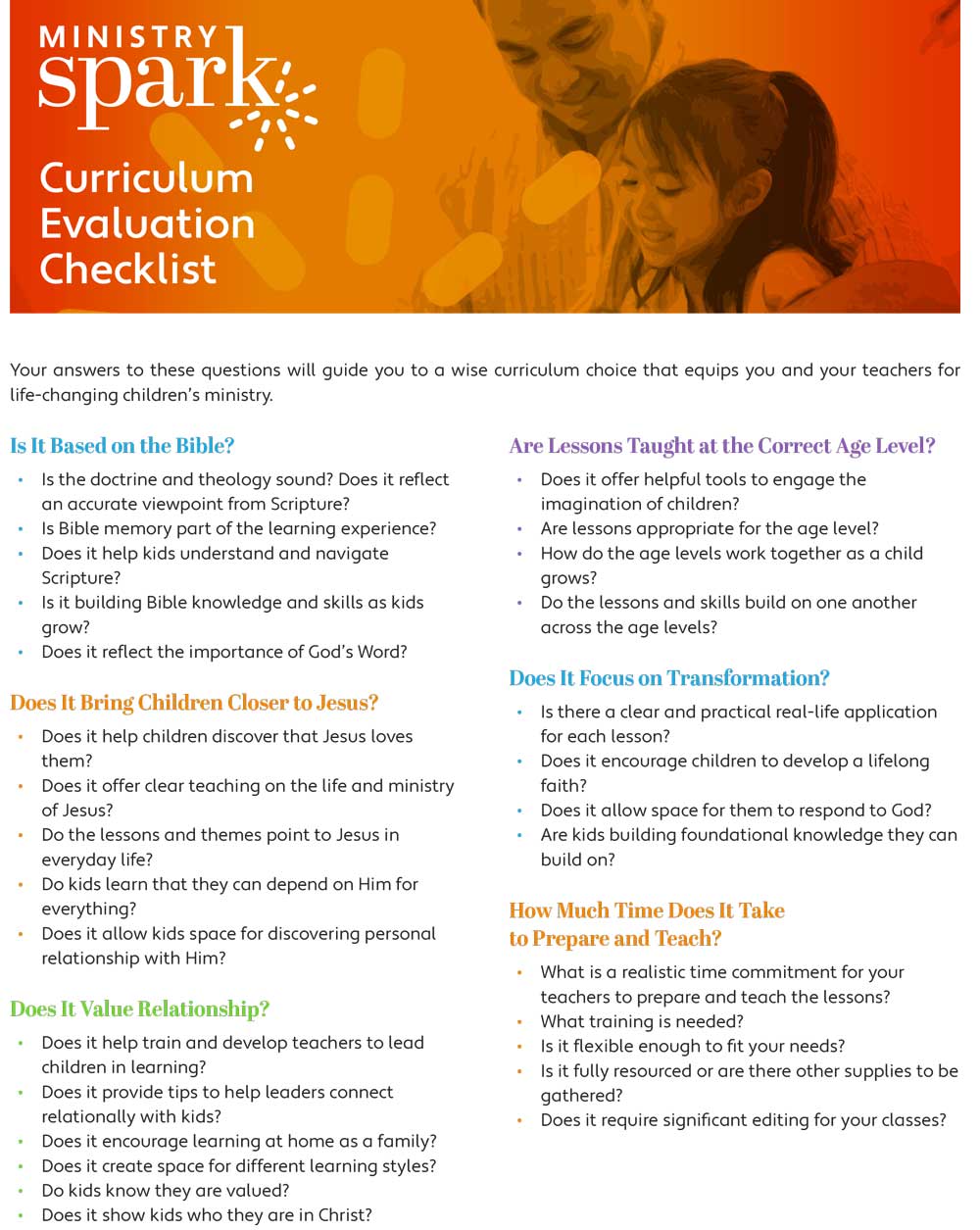We have the responsibility to ensure that the curriculum is rooted in God’s Word and prioritizes biblical teaching above all else.
It was the spring of 1996 when I found myself standing in front of a large shelf in the hallway of my seminary. The shelf was overflowing with samples of children’s ministry curriculum from publishers I had never even heard of before. My goal was to find the perfect curriculum for my church, so I carefully read through a lesson from each one.
After three hours of diligent reading, I walked away feeling deflated. I had come to the realization that there is no such thing as a perfect curriculum.
The search for the best curriculum is an ongoing challenge many of us in kids’ ministry face. Even after almost 30 years in ministry, evaluating and researching curriculum every few years is still a critical part of my role.
It’s surprising to see how many new children’s ministry curriculums are available each time we go through a curriculum review process. Walking through the halls of children’s ministry conferences and staying connected to kids’ ministry network through social media and ministry friends have been a great resource for me to stay updated on curriculum options.
Children’s Ministry Curriculum: What to Consider
There are many factors to consider when sifting through children’s ministry curriculum. Some factors are negotiable while others definitely are not. It is important to have a clear understanding of your non-negotiables for curriculum—these might be doctrine, culture and values, and philosophy—as well as the negotiable items such as delivery system, video options, age-level options, and more.

Curriculum Evaluation Checklist

Curriculum Evaluation Checklist

Curriculum Evaluation Checklist
My Top Five Criteria for Excellent Children’s Ministry Curriculum
Bible-Based Content:
- Who is the main person or focus of the story? Do the lessons point back to God as our Creator, Jesus as our Savior, and the Holy Spirit as our Helper?
- Are the lessons based on Bible stories and the truths of the Scripture?
One absolute non-negotiable factor is that the curriculum must be Bible-based. This may seem obvious, but I have been surprised by how many curriculums focus on a monthly theme, morals, or virtues without emphasizing God as our Creator, Jesus as our Savior, and the Holy Spirit as our Helper.
The truth of God’s Word is what transforms hearts and minds, and our kids need to be taught the fullness of it.
The monthly themes—like a carnival with carnival games as activities—can be fun. However, the Bible truths of Scripture should be at the heart of any curriculum. While fun activities and games can enhance the learning experience, they should never replace solid biblical teaching.
We have the responsibility to ensure that the curriculum is rooted in God’s Word and prioritizes biblical teaching above all else.
It is important to have a clear understanding of your non-negotiables for curriculum—these might be doctrine, culture and values, and philosophy.

Relationship Focus:
- Do the lessons foster relationships between the children and Jesus and with one another?
- Do the lessons and activities help kids know, love, and follow Jesus? Are their lives being transformed?
The gospel is all about relationships. God desires His children to grow in their relationship with Him and with others. Children are more likely to experience Jesus through relationships than by simply memorizing information about Jesus.
The time we have with kids during ministry is valuable and should be intentional. An excellent curriculum provides opportunities for kids to connect with God and with one another in meaningful ways.
This can be done through small group discussions, activities that foster teamwork, and serving together. We want to hear kids talking with one another and even laughing together.
Make sure your children’s ministry curriculum values relationships.
Age-Appropriate and Engaging Lessons:
- Are the lessons age-appropriate? Do the lessons use words and concepts that kids can understand? Do the lessons clearly explain metaphors and Christian idioms?
- Are the activities interactive and engaging for their age-level?
We often use Christian jargon without realizing that it may not be easily understood by children and some of our volunteers. Concepts such as redemption, glorifying God, repenting, and having Jesus in your heart can be challenging to grasp.
Therefore, it’s crucial to explain these concepts in age-appropriate language and clearly help them understand. I once had a child who kept telling me that he swallowed Jesus and that’s how He was in his heart.
An excellent curriculum will cater to different types of learners. It’s important to provide opportunities for toddlers and preschoolers to move and get their wiggles out. It’s important for elementary curriculum to provide activities that appeal to different types of learners, such as visual, auditory, and kinesthetic learners.
The activities should encourage participation and discussion at their appropriate age level as they connect with God.
Relevance:
- Does the curriculum allow space for kids to think, be curious, doubt, and ask questions?
- Do the lessons allow kids to process and walk away with tangible applications?
The Bible is as relevant today as it was years ago. An excellent curriculum cultivates a safe environment where kids can process and respond where they are in their faith in relation to how they are experiencing the world.
The lessons should not assume that kids are all in the same place in their spiritual journey. However, it provides space for them to doubt, question, and take the next tangible step with practical applications.
In our ministry, our kids know that “going to church,” “reading the Bible,” and “praying” are a given. It’s so important your children’s ministry curriculum gives clarity.
We ask for specific, practical next steps as their response to what they have learned each week. This also allows us to connect with parents and provide them with resources to continue the conversation at home.
The gospel is all about relationships.

User-Friendly and Adaptable Curriculum:
- How long does it take to edit and prepare the weekly lessons?
- Does the format meet your needs such as online components, editable lessons, large/small group model, children’s church model, etc.?
- Does the curriculum give variety activity options to meet the needs of churches/groups of all sizes, budget, and environment?
We all lead busy lives with many responsibilities. An excellent curriculum will provide easy-to-follow lessons that are not too time consuming to edit and prepare. It will offer flexibility and options to meet the needs of different church sizes, budgets, and styles. This may include providing both online-editable and printed booklet options.
This may also mean flexible lessons for children’s church, Sunday school, and large/small group models.
I value options for teaching methods and activities that can be adjusted as the ministry grows and resources become more limited.
For example, while individual take-home projects may be ideal, group projects that can be displayed in the ministry environment may be more practical as the ministry expands. An excellent curriculum provides flexibility to accommodate changes and growth in the ministry.
Providing the Best Experience
Curriculums evolve and change over time. It’s essential to stay up to date with the latest trends and changes in children’s ministry and curriculum development to ensure we are providing the best possible resources and experience for our kids.
There is no such thing as a perfect curriculum since no curriculum is tailored specifically to the to the needs and context of my church. However, with a little creativity and flexibility, there are curriculums available that I can easily edit and tweak to make it work beautifully for our ministry.

Curriculum Evaluation Checklist

Curriculum Evaluation Checklist











